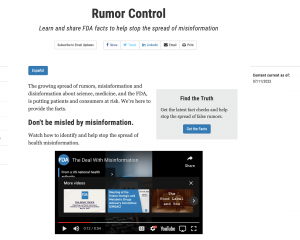The U.S. Food and Drug Administration (FDA) has launched a “Rumor Control” webpage on “the growing spread of rumors, misinformation, and disinformation about science, medicine, and the FDA.”
The webpage, which invites consumers to “[l]earn and share FDA facts to help stop the spread of misinformation,” debuted on June 3, 2023, nearly a year after FDA Commissioner Robert Califf stated controlling misinformation would be a top priority at the agency. The site features a video that states “some individuals and organizations promote opinions online disguised as fact” and that “misinformation can spread 6x faster than facts.”
The site shares links to Facebook, Instagram, LinkedIn, TikTok, Twitter, WhatsApp, and YouTube where users can report information they “believe to be false or misleading.” Most of the site features short videos on such topics as how to tell whether something is “Really ‘FDA’ Approved,’” and how “Bivalent COVID-19 Vaccines Provide Broad Protection Against COVID-19.”
Rather than providing information, the webpage disputes matters of opinion, says Linda Gorman, director of the Independence Institute’s Health Care Policy Center.
“What is bizarre about this is that the FDA chose to title it ‘Rumor Control,’ not a fact check or getting the facts,” said Gorman. “People have opinions, some are fact based, some are not. The FDA should engage in giving its view on claims that it feels are false, but the choice of “Rumor Control” as a title is tone deaf.”
Bias Against Free Speech
In the 60-second video, “What Does FDA Regulate?” a narrator describes how the FDA regulates a sizable chunk of what consumers spend on products, “20 cents of every dollar.”
Another video, “Why does the FDA Exist?” talks about how contaminated food was a crisis at the turn of the 20th century when scientists detected formaldehyde, borax, and other toxic preservatives in U.S. manufactured foods.
The video explains how this led to the Pure Food and Drugs Act of 1906. Since then, about every 30 years, major categories have been added to the FDA’s purview, from the regulation of cosmetics in 1938 to biologics and medical devices in the 1970s.
Such marketing can give insight into the mindset of government regulators, says Gorman.
“The FDA, like many of the state and federal health bureaucracies, has a history suggesting that those who staff it are not happy with the level of free speech guaranteed by the U.S. Constitution,” said Gorman. “People asking inconvenient questions about how bureaucrats go about their jobs means they have to explain themselves. This is often difficult, boring, and time-consuming. It makes it harder for an agency to achieve its aims, aims which may or may not be in the best interest of the people who fund it.”
Regulating ‘Misbranding’
One area that has received much scrutiny is under the 1962 Kefauver-Harris Amendments that expanded the FDA’s authority to regulate drug efficacy, in addition to safety, and criminalized the misrepresentation of a drug’s effects.
“The FDA bureaucracy went to work, and, because government never knows when to stop, ended up trying to prosecute manufacturers for misbranding even when they disseminated truthful statements about off-label uses,” said Gorman.
A 2021 study, “A Legislative/Legal History of Prescription Drug Advertising and Prescription Drug Advertising and Promotion Regulation,” highlighted the agency’s overreach and how lawsuits against the agency proved drug manufacturers can communicate accurate drug information without FDA oversight.

Protecting Its Turf
Because the average cost of developing a new drug has risen to more than $2 billion, physicians tend to look for multiple uses beyond the narrow one approved by the FDA.
“[D]rug manufacturers’ representatives would tell physicians that other doctors were getting good results using drug X for condition Y, distribute peer-reviewed articles describing additional uses, or provide unpublished study results,” said Gorman. “The FDA did not like this at all. It went after the drug companies.”
Courts have sided with physicians and the FDA had no business blocking accurate information about off-label use, says Gorman.
“As long as off-label prescribing is allowed, physicians, not the FDA, should control the medical practice,” said Gorman. “This hasn’t stopped the FDA from trying to practice medicine.”
Misuse of Resources
“The FDA is free to use surplus agency resources to offer its opinion on the speech that it labels rumors,” said Gorman. “However, it might be better off focusing on the quality of generic drugs. Recent scandals have shown that it is woefully lacking.”
In 2020, Harry M. Lever, M.D, a cardiologist at the Cleveland Clinic, published an article on the failure of FDA oversight of multiple generic drugs from countries with poor safety records. Some 1,159 lots from one class of drugs, angiotensin receptor blockers, had to be recalled due to contamination concerns.
“This has made it hard to write prescriptions for this class of drugs because at any one time it is difficult to know which lots have been contaminated,” wrote Lever. “The testing of individual lots of internationally sourced generic drugs for potency and purity is not consistently done, and even when it is, it is not reported to practicing physicians.”
Lever wrote that he complained to the FDA, but it took 18 months to get a response.
The FDA has also been criticized for its “unresponsiveness” to safety concerns over the COVID-19 shots. The agency is also being sued for approving the abortion pill, mifepristone, without regard to safety concerns.
“Rumors are simply speech,” said Gorman. “The FDA should stick to drug approval rather than approving sources of information.”
Ashley Bateman (bateman.ae@googlemail.com) writes from Virginia.




















